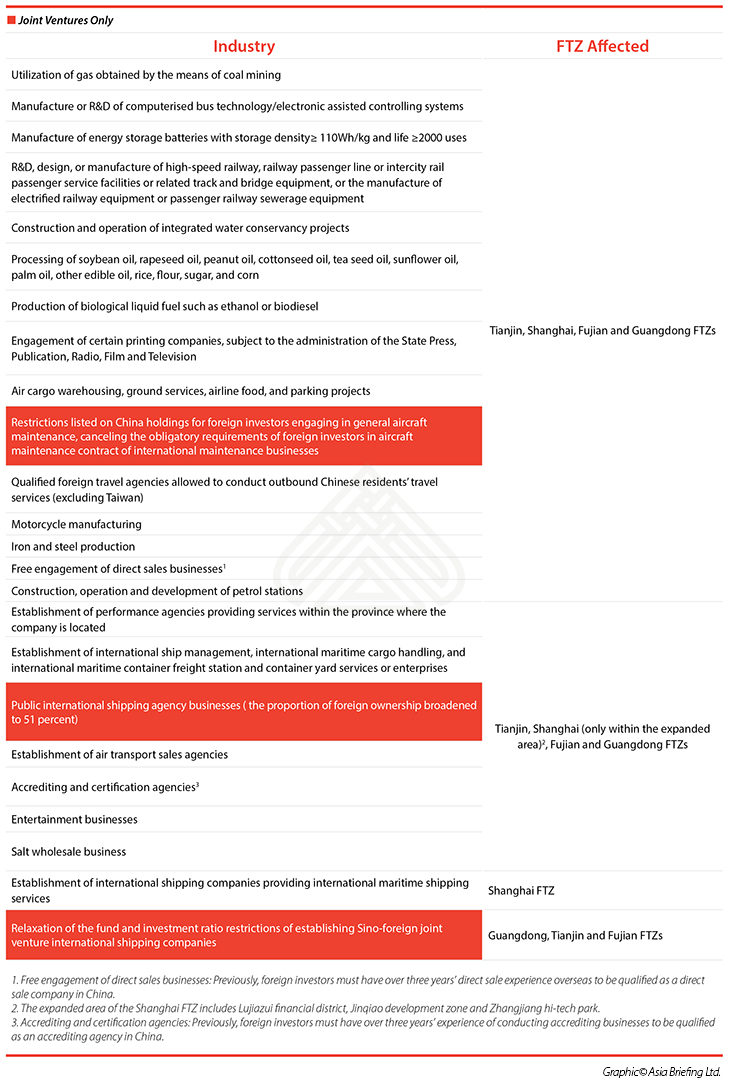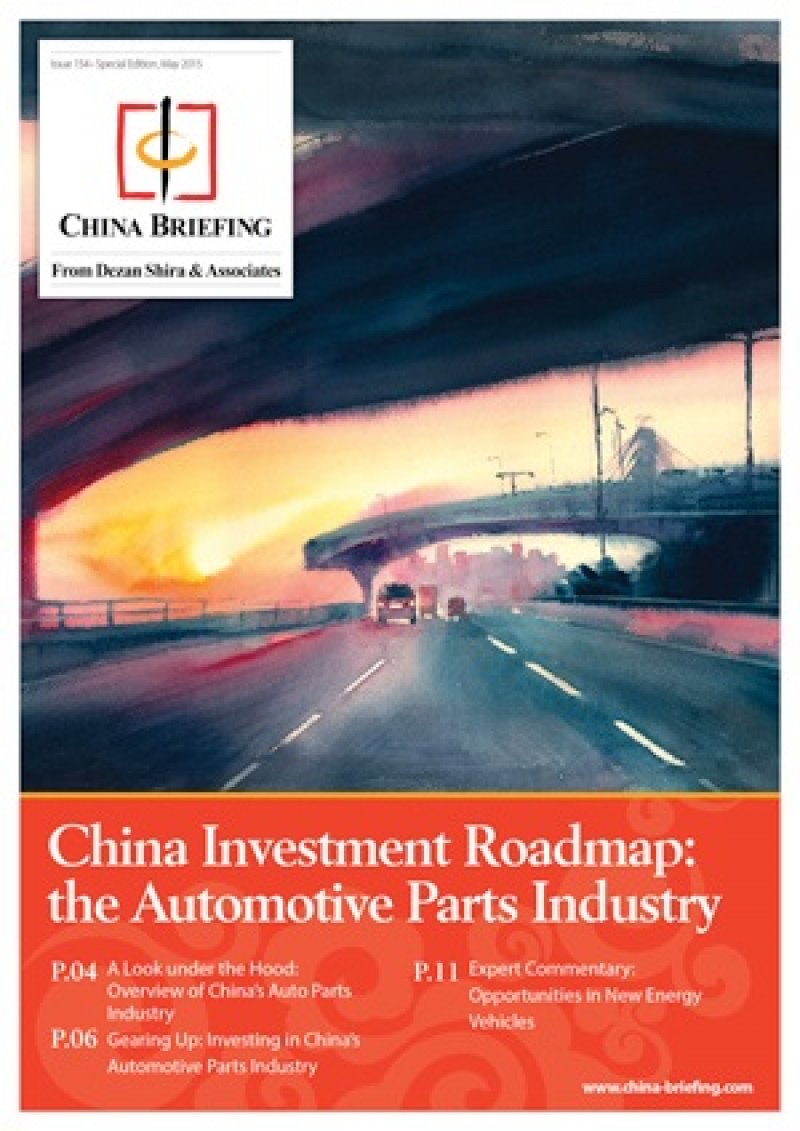China’s Free Trade Zones Open Further to Foreign Investment
By Dezan Shira & Associates
Editor: Jake Liddle
Last month, the State Council announced plans to adjust regulations regarding foreign investment into the Tianjin, Shanghai, Fujian and Guangdong free trade zones (FTZs), which will significantly affect application and entry procedures.
The adjustments are split two ways – some that simplify application procedures and the operation of foreign invested or joint venture enterprises, and others that open once restricted sectors to foreign investment. Either way, it is important for investors looking to enter or already in these FTZs to be aware of these latest regulatory adjustments.
Below, we detail the industries in which previous restrictive related content or regulations have been temporarily suspended, thus allowing the involvement of foreign invested companies:
Additionally, the government lifted the restrictions on foreign investors wishing to partake in the purchase of grain, wholesale of cotton and grain and operation and construction of large scale agricultural product wholesale market in all the three FTZs. The requirements of Mainland holdings for Sino-Taiwanese joint ventures engaged in crop production (except cotton and oil crops), breeding of new crop varieties (except transgenic) and seed production (except GM products) have also been temporarily suspended in the Fujian FTZ.
 RELATED: Pre-Investment and Entry Strategy Advisory
RELATED: Pre-Investment and Entry Strategy Advisory
For sectors not included in the FTZs’ Negative List for Foreign Investment – which determines which industries foreign companies can invest in – the following conditions will be temporarily suspended and replaced with a filing administration system in all FTZs:
- Approval of foreign investment projects
- Approval of establishment of foreign invested enterprises (FIEs), Sino-foreign joint ventures or Taiwanese invested enterprises;
- Merging or separation of FIEs, or any other such reasons which cause significant change to capital approval;
- Changes to the amount of registered capital requirements for FIEs or Sino-foreign joint venture;
- Foreign mortgage or transfer approval of property owned by FIEs;
- Approval of contribution by foreign or Sino-foreign investors.
- Approval of the operation period of FIEs.
- Approval of Sino-foreign joint venture equity transfer.
- Approval of Sino-Foreign joint funded/joint venture disbandment.
- Approval of major changes to the contract, agreement or rules of a Sino-foreign joint venture.
- Reduction of registered capital of a Sino-foreign joint venture.
- Approval of the transfer of rights as stipulated in the contract of a Sino-foreign joint venture.
- Approval of Sino-foreign joint venture entrustment of operation management contracts.
- Approval of examination and ratification of a foreign partner’s advance recovery investment report.
- Approval of extension of Sino-foreign joint venture cooperation period.
- Temporarily cancel special requirements for foreign-invested enterprises to obtain certification of organization qualifications.
These adjustments open up and simplify the entry procedures for a significant amount of new sectors. The duration of temporary suspension and the cancellation of restrictive policies have not yet been disclosed, but it is safe to say that these adjustments signal further steps towards opening up investment into the trade zones, and will provide increased opportunities for foreign companies.
|
Asia Briefing Ltd. is a subsidiary of Dezan Shira & Associates. Dezan Shira is a specialist foreign direct investment practice, providing corporate establishment, business advisory, tax advisory and compliance, accounting, payroll, due diligence and financial review services to multinationals investing in China, Hong Kong, India, Vietnam, Singapore and the rest of ASEAN. For further information, please email china@dezshira.com or visit www.dezshira.com. Stay up to date with the latest business and investment trends in Asia by subscribing to our complimentary update service featuring news, commentary and regulatory insight. |

 A Guide to China’s Free Trade Zones
A Guide to China’s Free Trade Zones
In this issue of China Briefing magazine, we examine China’s four Free Trade Zones and discuss the differences and strongpoints that exist in each of them. We begin by providing an introduction to the FTZs, and then take an in-depth look at the market access conditions, registration procedures and tax environments of each. Finally, we highlight some of the key considerations that foreign companies should be aware of when choosing an FTZ to invest in.
China Investment Roadmap: the Automotive Parts Industry
This issue of China Briefing presents a roadmap for investing in China’s automotive industry. We begin by providing an overview of the industry, and then take a comprehensive look at key foreign investment considerations, including investment restrictions, tax incentives and manufacturing requirements. Finally, we discuss foreign investment opportunities in a part of the industry that receives substantial government support: new energy vehicles.
 Revisiting the Shanghai Free Trade Zone: A Year of Reforms
Revisiting the Shanghai Free Trade Zone: A Year of Reforms
In this issue of China Briefing, we revisit the Shanghai FTZ and its preferential environment for foreign investment. In the first three articles, we highlight the many changes that have been introduced in the Zone’s first year of operations, including the 2014 Revised Negative List, as well as new measures relating to alternative dispute resolution, cash pooling, and logistics. Lastly, we include a case study of a foreign company successfully utilizing the Shanghai FTZ to access the Outbound Tourism Industry.
- Previous Article Human Resources and Payroll in China 2016/17 – New Publication from China Briefing
- Next Article Cutting Through the Red Tape: CFDA Plans to Accelerate the Review Process for Medical Devices











